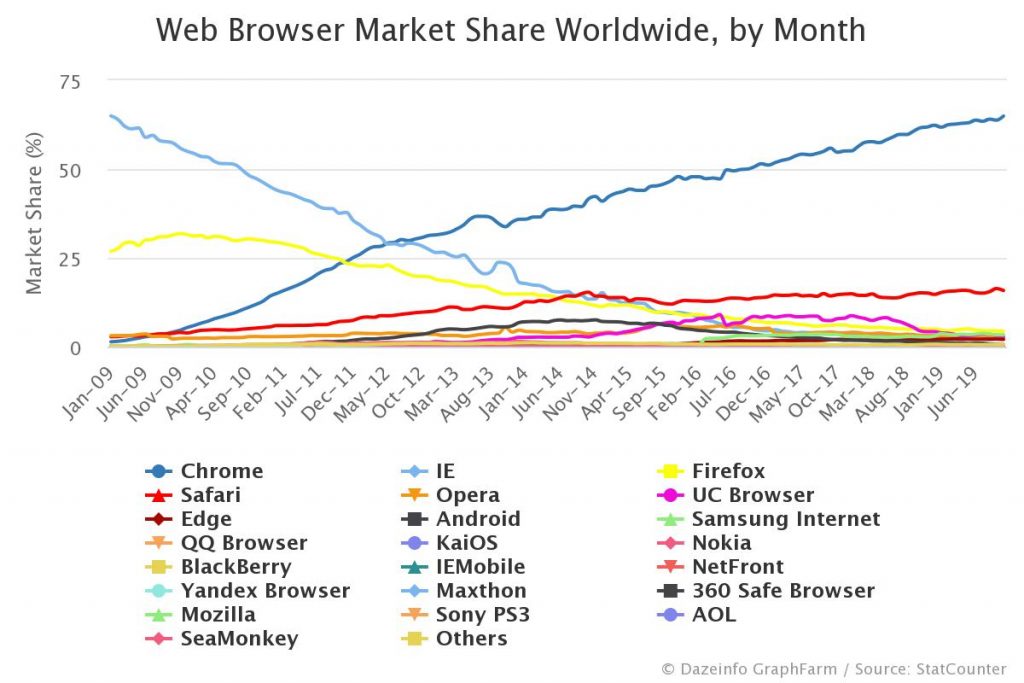The latest version of the Microsoft Edge browser was launched about a month ago for Windows 10, Windows 8, Windows 8.1, and Windows 7. The new version comes with a significant change which makes it a more formidable opponent to rival browsers than it was before. Given these changes, Google seems to be becoming frantic about eventually losing a considerable mass of users to Microsoft’s new browser.
The New Microsoft Edge
In July 2015, Microsoft replaced its previous default browser, the Internet Explorer with Microsoft Edge. Infamous for being slow and having limited features, Internet Explorer competed poorly in a market full of better browsers. The IE was constantly losing the market share with each month and accounted for just 10.5% of worldwide web browser market share then.
Edge, thus, was a massive level up, in terms of speed. However, Internet Explorer remained better in terms of privacy and whitelisting features, up until the January update.
Since the launch in 2015, this is the first major upgrade for Edge. Previously based on the EdgeHTML source-code, the new Edge is now based on Chromium, which is also the open-source code for the Google Chrome browser.
Chromium gives Edge some brilliant new features such as a wider selection of extensions that can be downloaded from the Chrome Web Store. And it is here that Google is implementing its customer retention tactics.
Users have noticed that when they access the Chrome Web Store from Edge, a pop up from Google appears stating that for better security, the user should switch to installing the extension on Chrome.

While this would’ve been a valid warning if evidence of the same were provided, Google seems to be making these claims based on no grounds. Furthermore, the argument seems arbitrary given that both browsers function of the same source codes.
What Goes Around Comes Around
Google’s poorly justified warning is underhanded and stands testament to the growing backlash against big tech for unfair and excessive dodging of competition.
Another worrying aspect of Google’s strategy is the use of userAgent tags to identify who is accessing the Web Store using Chrome and who’s doing so using Edge. Ideally, the userAgent tag should not be used to keep tabs on user activity in such a manner.
However, this isn’t the first time Microsoft and Google have been in a tiff regarding user retention, and previously, the culprit was the former.
Microsoft, being the developer for the Windows OS, uses its position to promote the use of Edge by installing the browser as the default browser for the system, unless the user manually sets another one as the default.
In fact, the company also tried to discourage users from installing Chrome browser on Windows OS based system when they searched for the Google Chrome browser using Edge.
It was also reported that during the initial years of the launch of Edge browser Microsoft threw a warning message to users when they tried to make Google Chrome as their default web browser.
Could Microsoft Edge Become a Strong Contender for Existing Browsers?
Since its launch, several tech bloggers and journals have tried to dissect the pros and cons of the new Edge.
The consensus seems to be that it is up to mark and is capable, for the first time, of competing with existing browsers.
Some of the most well-received features, apart from increased extension compatibility, seems to be the lack of bloatware, the ability to restrict ad tracking and whitelisting selected sites, and smoother scrolling experience.

Microsoft is the second most valuable brand in the world according to Forbes. But when it comes to b browser it accounts for just 4.2% of the world wide web browsers’ market share. Google Chrome dominates the market with 64.9% share while the market share of IE has reduced to just 2.4%. On the other hand, the growth of Microsft Edge has been largely flat as it accounts for just 2% of the market even after 4 years.
The company has been going through a transition period in its journey, with plans to change and introduce many new things into their repertoire of products and services.
However, Microsoft, as well as Google have both been in various controversies surrounding user privacy, software bugs, data leaks, and buying data from unethical third party sources.

